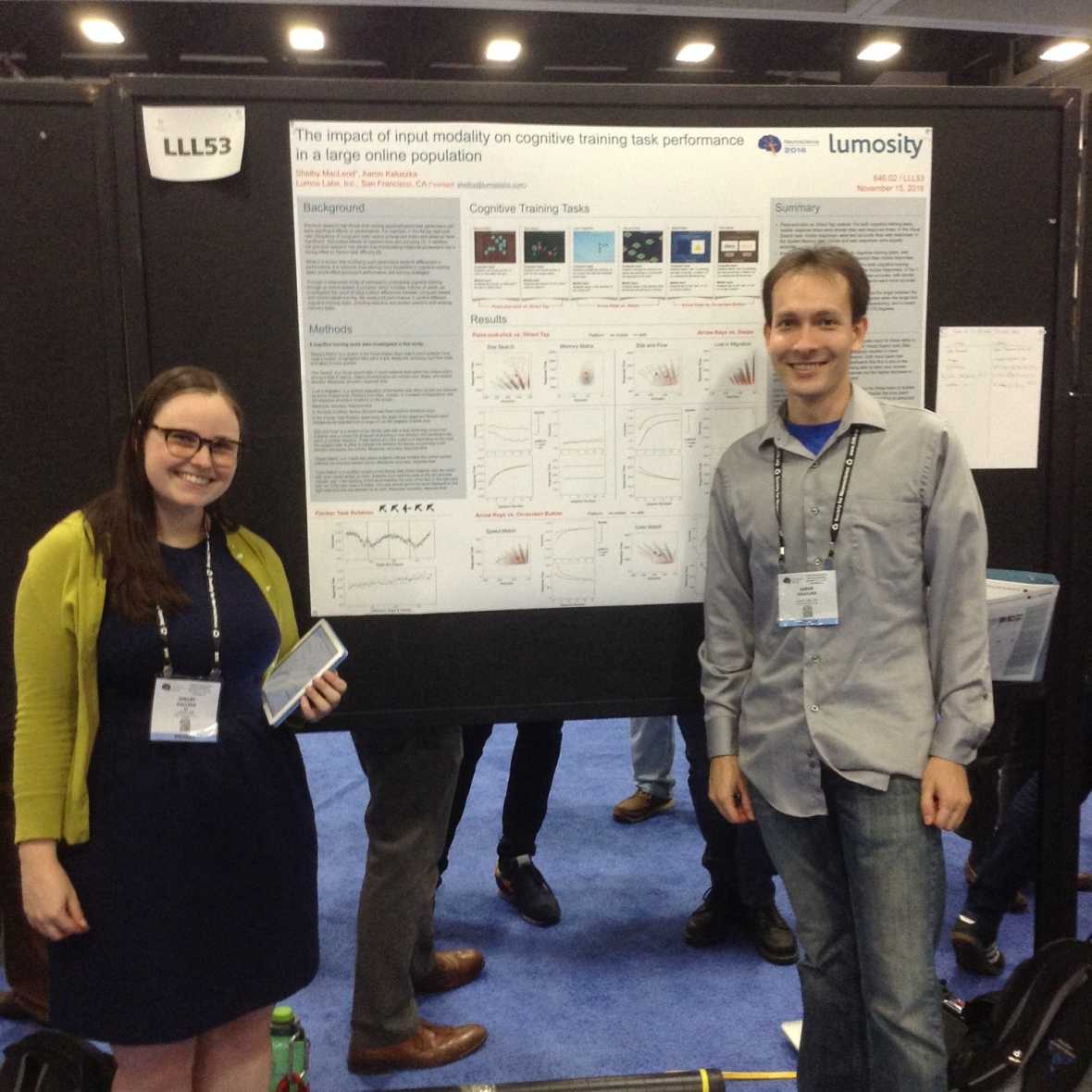
Lumosity at the 2016 Society for Neuroscience Annual Meeting
The Lumosity Research team has a number of different objectives: they work closely with our Product teams to scientifically design games and features; they conduct internal studies and analyses of Lumosity and the NeuroCognitive Performance Test (NCPT); and they partner with independent researchers through the Human Cognition Project (HCP) to accelerate the pace of research on human cognition. Ultimately, the Research Team’s goal is to improve our understanding of cognition and cognitive training to in turn improve Lumosity products and inform science more generally.
The Lumosity Research team has participated in the Society for Neuroscience’s annual meeting since 2007 to present new findings, learn from experts, trade ideas with peers, and explore new avenues for research. This year’s conference was held on November 12-16 in San Diego and the team exhibited four posters, sharing preliminary findings from certain research on Lumosity and the NeuroCognitive Performance Test (NCPT), an online neuropsychological assessment.
The team plans to expand some of these posters with further research and submit them as papers to peer-reviewed journals.
One poster, “The impact of input modality on cognitive training task performance in a large online population,” looked at how performance on different Lumosity games differed based on how players interacted with the specific game. For instance, if you play Lost in Migration on your computer, you use your arrow keys to play the game, but when you play Lost in Migration on a phone or tablet, you swipe with your finger to play. Could these different “input modalities” on different platforms be correlated with any changes in performance? The team looked at gameplay data from a total of six games in three different categories to try to find out:
Games that use Point-and-click on computers but Direct Taps on mobile devices
- Memory Matrix
- Star Search
Games that use Arrow Keys on computers but Swipes on mobile devices
- Lost in Migration
- Ebb and Flow
Games that use Arrow Keys on computers but On-screen Buttons on mobile devices
- Speed Match
- Color Match
Overall, they found that changing these input modalities may have a significant effect on performance, but that more research is needed to understand the nuances of these effects. For instance, in the Arrow Keys vs Swipes category, players responded both more quickly and more accurately when training on mobile devices, while for the Point-and-click vs Direct Taps category it depended on the specific task: for both Memory Matrix and Star Search, players responded more quickly on mobile, but accuracy remained consistent between web and mobile on Memory Matrix and declined on mobile for Star Search. Why do these differences arise? The team hopes to find out with further analysis and findings will help guide both future product decisions and study designs.
Another poster looked at the Human Cognition Project (HCP) and was selected by the conference as a “Hot Topic” for this year’s meeting. You can learn more about the HCP here, but the poster provided an overview of the numerous ways in which the HCP is able to support independent researchers. These include providing researchers with free access to Lumosity, the NCPT, surveys, and de-identified subsets of game scoring data -- a useful longitudinal dataset of human cognitive performance. It’s our belief that our online tools and data can alleviate traditional research’s common cost and time burdens, in turn fostering greater innovation and more high-powered studies.
Today, the HCP supports 62 ongoing studies with over 90 researchers -- including 10 international collaborators. Some topics our partners are currently investigating are normal aging, certain clinical conditions, and the relationship between physical exercise and Lumosity training.
If you’re a researcher interested in working with the HCP, the Research team reviews applications on a quarterly basis, and the final deadline for 2016 is December 7 at 5pm PT. We welcome thoughtful, forward-thinking proposals and you can start the application process here: www.lumosity.com/hcp/research/apply.
The team is already looking forward to next year’s Society for Neuroscience meeting. In the meantime, they’re eager to get back to work expanding their posters, exploring additional research topics, and collaborating with HCP researchers -- new and old alike.
